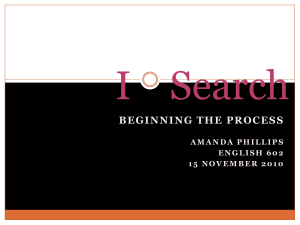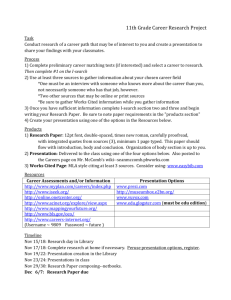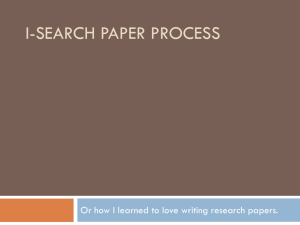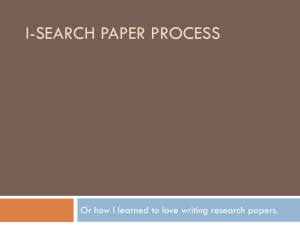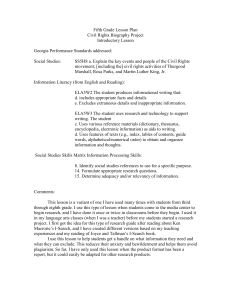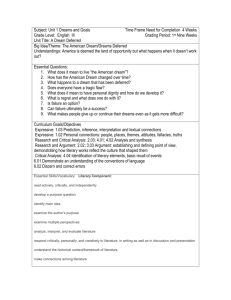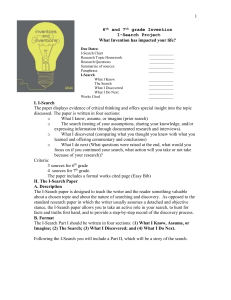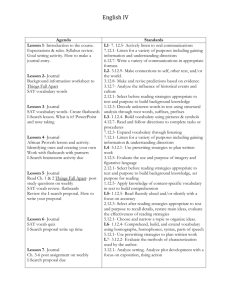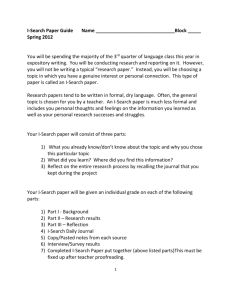English 101: College Composition
advertisement
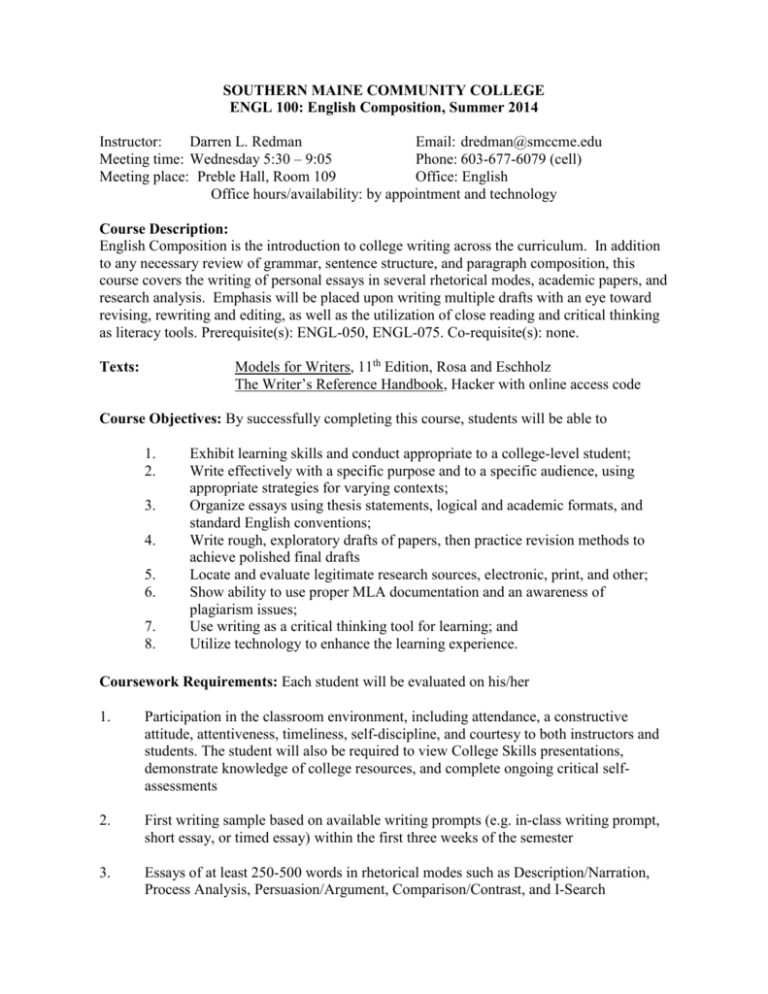
SOUTHERN MAINE COMMUNITY COLLEGE ENGL 100: English Composition, Summer 2014 Instructor: Darren L. Redman Email: dredman@smccme.edu Meeting time: Wednesday 5:30 – 9:05 Phone: 603-677-6079 (cell) Meeting place: Preble Hall, Room 109 Office: English Office hours/availability: by appointment and technology Course Description: English Composition is the introduction to college writing across the curriculum. In addition to any necessary review of grammar, sentence structure, and paragraph composition, this course covers the writing of personal essays in several rhetorical modes, academic papers, and research analysis. Emphasis will be placed upon writing multiple drafts with an eye toward revising, rewriting and editing, as well as the utilization of close reading and critical thinking as literacy tools. Prerequisite(s): ENGL-050, ENGL-075. Co-requisite(s): none. Models for Writers, 11th Edition, Rosa and Eschholz The Writer’s Reference Handbook, Hacker with online access code Texts: Course Objectives: By successfully completing this course, students will be able to 1. 2. 3. 4. 5. 6. 7. 8. Exhibit learning skills and conduct appropriate to a college-level student; Write effectively with a specific purpose and to a specific audience, using appropriate strategies for varying contexts; Organize essays using thesis statements, logical and academic formats, and standard English conventions; Write rough, exploratory drafts of papers, then practice revision methods to achieve polished final drafts Locate and evaluate legitimate research sources, electronic, print, and other; Show ability to use proper MLA documentation and an awareness of plagiarism issues; Use writing as a critical thinking tool for learning; and Utilize technology to enhance the learning experience. Coursework Requirements: Each student will be evaluated on his/her 1. Participation in the classroom environment, including attendance, a constructive attitude, attentiveness, timeliness, self-discipline, and courtesy to both instructors and students. The student will also be required to view College Skills presentations, demonstrate knowledge of college resources, and complete ongoing critical selfassessments 2. First writing sample based on available writing prompts (e.g. in-class writing prompt, short essay, or timed essay) within the first three weeks of the semester 3. Essays of at least 250-500 words in rhetorical modes such as Description/Narration, Process Analysis, Persuasion/Argument, Comparison/Contrast, and I-Search 4. One Research Project (1000 - 2000 words) demonstrating proper research documentation and critical thinking skills following completion of Research Activities 5. Multiple drafts (2 to 3) of any of the above papers, using revision strategies: Peer Review or Personal Process Statement or Self-Critique 6. A portfolio including, but not limited, to items 3-5 above. Portfolios will be returned to students before the last day of class Grades: Participation: 0% (willing engagement to share inside and outside of class) First Writing Sample: 0% (a baseline to assess how best to improve and to support) Essays: 0% (four essays and one research project as Google or paper documents) Research Project: 0% (the I-Search Paper as the required research project) Revision: 0% (common sense, practical experience, skill enhancement) Portfolio: 100% (What and how you write should be the focus of a writing course!) Classroom Policies Attendance Policy: As stated in the SMCC College Catalog, after a student incurs three or more consecutive absences from regular class meetings without communicating with the instructor, the instructor must report the absences to Enrollment Services and assign the student a grade of “AF” (Administrative Failure). This policy may be interpreted as three or more hours’ absence from regular class meetings. Faculty members have authority to establish attendance standards appropriate to their course. Late Work Policy: Please don’t be late with your work as it negatively affects your ability to receive timely feedback and to display appropriate progress. Topical Outline: 1. The Writing Process 2. Myths about Writing 3. Purpose, Audience, and Strategy 4. Grammar and Punctuation Issues 5. Topic Sentences/Main Ideas 6. The Thesis Statement 7. Organizing/Outlines 8. Revising, Editing, and Proofreading 9. Timed Writing 10. Peer Critiquing 11. Information Literacy 12. Using and Quoting Sources College Policies End-of-Course Evaluation: In order to gain access to final course grades, students must complete evaluations for each course attended at SMCC. Evaluations are submitted online and can be accessed through the student portal site. Students can access the course evaluation report beginning two weeks before the end of classes. The deadline for submission of evaluations occurs 24 hours after the last day of classes each semester. Instructors will announce when the online course evaluation is available. ADA Syllabus Statement: Southern Maine Community College is an equal opportunity/affirmative action institution and employer. For more information, please call 207-741-5798. If you have a disabling condition and wish to request accommodations in order to have reasonable access to the programs and services offered by SMCC, you must register with the disability services coordinator, Mark Krogman, who can be reached at 741-5629. There will be some documentation for your teachers that must be supplied before accommodations can be given. Further information about services for students with disabilities and the accommodation process is available upon request at this number. SMCC Pay-for-Print Policy: Students can print 150 pages per semester for free. If you print over 150 pages, you will be charged 10 cents per page to your Beacon Bucks account. Left-over pages will roll over to the following semester but will zero out at the end of the academic year. A pilot project tracking public printing has shown that this amount of free printing meets the needs of the vast majority of students. The College’s pay-for-print system monitors printing on all public printers (i.e., those in general access labs, library printers, the AAC, and technology labs). Each time you log in to the system, the print station displays the remaining print quota. Once the printing quota has been exceeded, users will be charged $0.10 per page on their Beacon Bucks accounts. Color printouts will be charged at 11-page units. This means each color printout will count as 11 pages toward the quota and cost $1.10. Students can add money to their cards using a credit card online. Add-Drop Policy: Students who drop a course during the one-week “add/drop” period in the fall and spring semesters and the first three days of summer sessions receive a 100% refund of the tuition and associated fees for that course. Please note any course that meets for less than the traditional semester length, i.e., 15 weeks, has a pro-rated add/drop period. There is no refund for nonattendance. Withdrawal Policy: A student may withdraw from a course only during the semester in which s/he is registered for that course. The withdrawal period is the second through twelfth week of the fall and spring semesters and the second through ninth week of twelve-week summer courses. This period is pro-rated for shorter-length courses. To withdraw from a course, a student must complete and submit the appropriate course withdrawal form, available at the Enrollment Service Center (no phone calls, please). The designation “W” will appear on the transcript after a student has officially withdrawn. A course withdrawal is an uncompleted course and may adversely affect financial aid eligibility. Failure to attend or ceasing to attend class does not constitute withdrawal from the course. There is no refund associated with a withdrawal. Plagiarism Statement: Adherence to ethical academic standards is obligatory. Cheating is a serious offense, whether it consists of taking credit for work done by another person or doing work for which another person will receive credit. Taking and using the ideas or writings of another person without clearly and fully crediting the source is plagiarism and violates the academic code as well as the Student Code of Conduct. If it is suspected that a student in any course in which s/he is enrolled has knowingly committed such a violation, the faculty member should refer the matter to the College’s Disciplinary Officer and appropriate action will be taken under the Student Code of Conduct. Sanctions may include suspension from the course and a failing grade in the course. Students have the right to appeal these actions to the Disciplinary Committee under the terms outlined in the Student Code of Conduct. Schedule: Week 1 – introduction, syllabus, rules of engagement, and in-class writing/peer editing Week 2 – Description/Narration (draft 1) and I-Search choosing of a question/topic Week 3 – Description/Narration (draft 2) and I-Search “My Topic/Why I Chose It” Week 4 – Process Analysis (draft 1) and I-Search “What I Know/Don’t Know” Week 5 – Process Analysis (draft 2) and I-Search first interview questions Week 6 – Comparison/Contrast (draft 1) and I-Search “The Process/First Interview” Week 7 – Comparison/Contrast (draft 2) and I-Search “The Process/First Reference” Week 8 – Argument/Persuasion (draft 1) and I-Search “The Process/Second Interview” Week 9 – Argument/Persuasion (draft 2) and I-Search “The Process/Second Reference” Week 10 – I-Search “What I Learned” Week 11 – I-Search “Citations” Week 12 – portfolio and celebration
